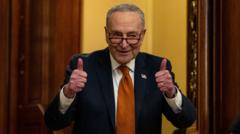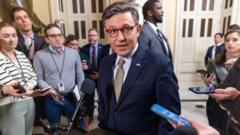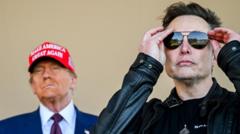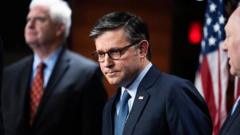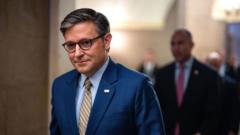With a Republican trifecta in place, Trump faces both opportunities and challenges in fulfilling his campaign promises amidst ongoing political dynamics.
Trump's Strong Grip on Congress: A Double-Edged Sword

Trump's Strong Grip on Congress: A Double-Edged Sword
While Donald Trump assumes control of Congress, can he navigate the complexities of governance?
On election night, Donald Trump proclaimed, "Promises made, promises kept." With Republicans officially taking control of Congress, he appears to have a much clearer path to fulfilling those promises. In political jargon, this situation is termed a "governing trifecta," where the president's party wields control over both chambers of Congress—the House of Representatives and the Senate.
However, such control, once a common occurrence, has become rare in recent decades. Parties often lose seats in midterm elections, which can complicate governance. Both Trump and Joe Biden enjoyed trifectas during their first two years in office, only to find that on paper, control does not assure a smooth legislative process.
In his initial term, Trump managed to push through significant tax cuts, lowering corporate taxes from 35% to 21%. Yet, he faced considerable hurdles, including resistance from within his party, which thwarted key initiatives like the repeal of the Affordable Care Act (ACA) and an ambitious infrastructure bill.
Conversely, Biden, during his tenure with a Democratic trifecta, successfully passed the American Rescue Plan, the Investment and Jobs Act, and the Chips and Science Act. However, just as Trump encountered, Biden had to make significant concessions to secure votes — notably when Senator Joe Manchin blocked the broader Build Back Better initiative.
A persistent barrier for any administration is the Senate filibuster, which necessitates a three-fifths majority to move legislation forward. Hence, even with a Republican majority, Trump lacks the coveted 60 seats required to thwart opposition efforts. The recent selection of John Thune as Senate majority leader over Trump-endorsed Rick Scott signals a potential independence among some Republicans.
Yet, a trifecta can allow for significant legislative initiatives if managed wisely. Trump may leverage his congressional power to pursue bold proposals, such as mass deportations, raising tariffs on imports, and dismantling environmental regulations. Legislative methods would be less vulnerable to judicial challenges than the executive orders that faced legal impediments during his first term.
Furthermore, Trump's previous term was marked by strategically placing three justices on the Supreme Court, ensuring a substantial conservative majority for potentially decades. His Republican Senate majority will also enable smoother approval for his administrative nominees, a struggle he faced in his early presidency due to lingering internal party dissent.
The landscape indicates that the upcoming years could be fast-paced and contentious. Nevertheless, historical trends suggest that such trifectas often diminish, and Trump's administration would do well to act swiftly and decisively while implementing its legislative agenda.

